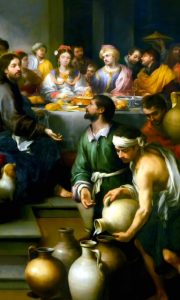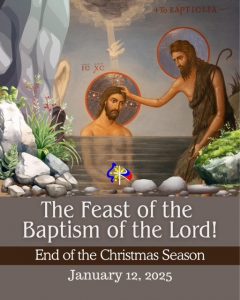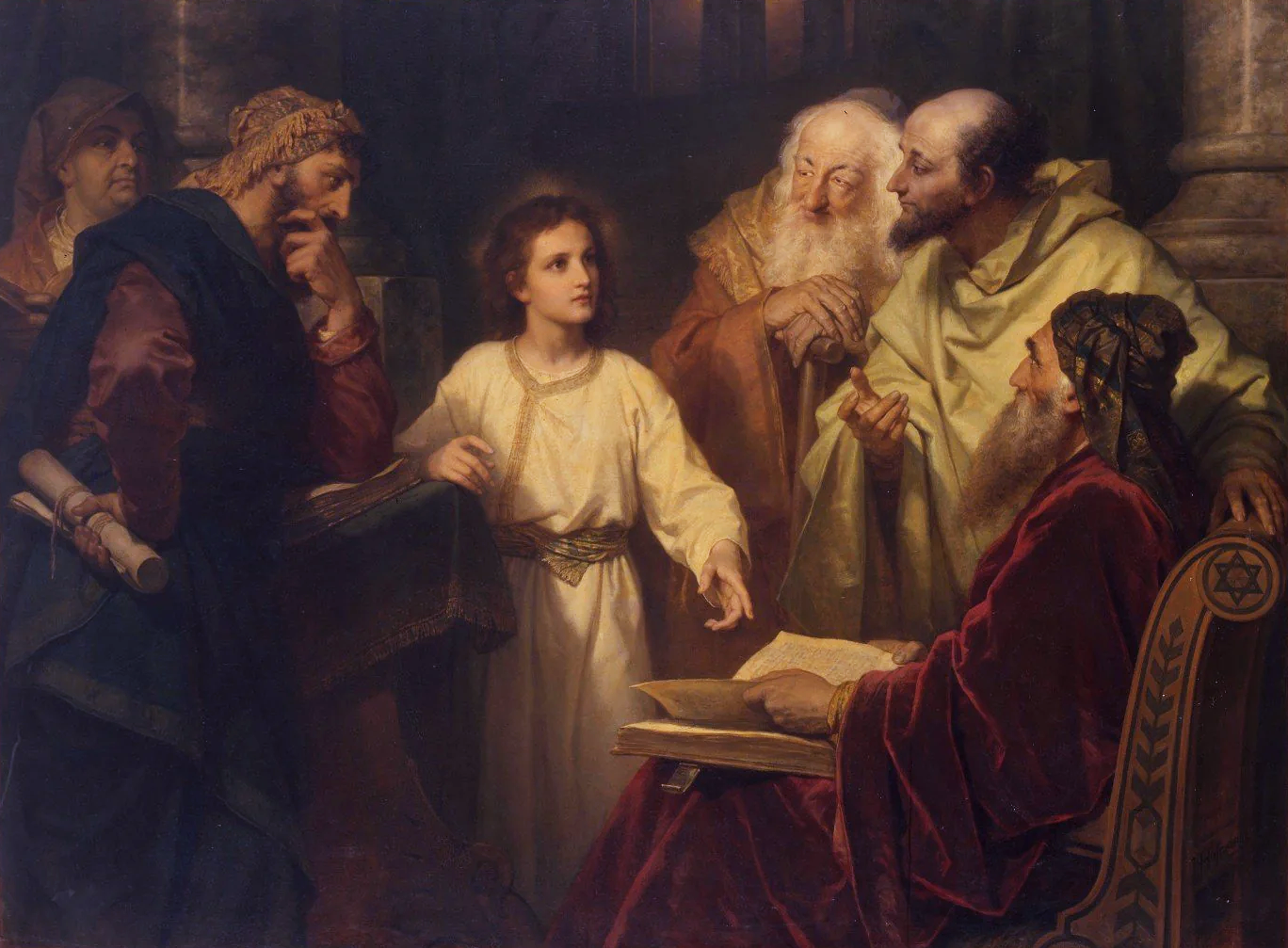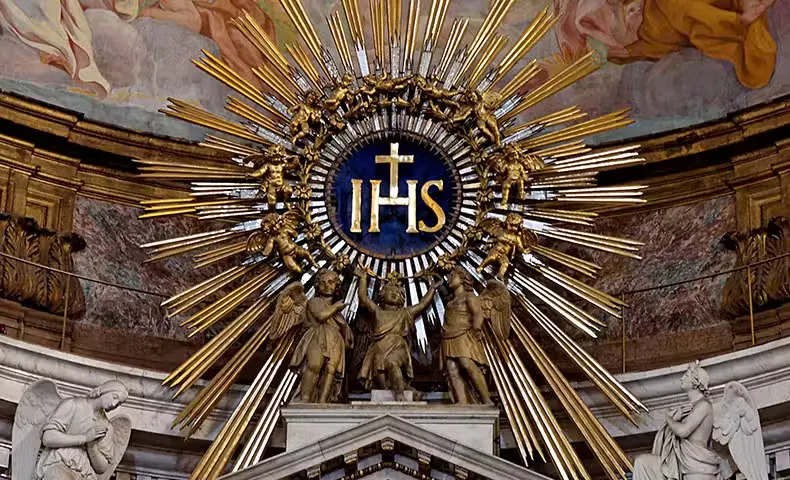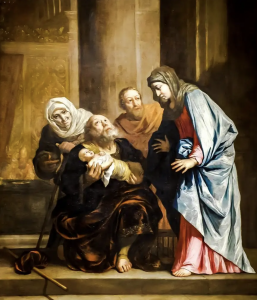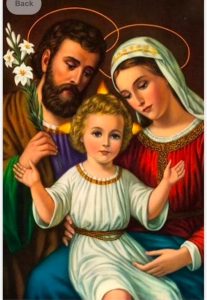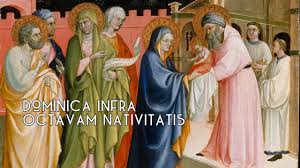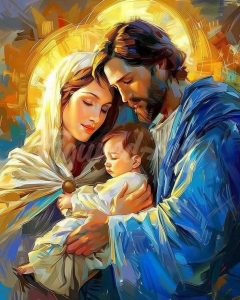Today, we are back to the Ordinary Time of the church liturgical calendar. I think of the recent fire in LA, California (January 2025) at which many are displaced, lost their livelihood, properties and death tolls are expected to rise. It would probably take more time for them to recover from grief, the rubbles and ashes brought about by this wildfire. Every natural disaster occurs we become insightful on how our human and spiritual relationships be deepened, realizing also how human become vulnerable. Therefore, we develop awareness to focus on improving relationships with God, family and find direction of establishing relationship with the larger community. In times of crisis, of course, we must be resilient, but we must turn ourselves to the Lord in adoration, prayer and petitions.
We must not be distracted by fears and anxieties, for God is with us, what we need is to realize the full importance of relationships and to know life’s driven purpose. Our main theme for today is about relationship, full of promise and goodness. In today’s first reading taken from the Prophet Isaiah leads me to think that God is more opening the door to a relationship than serving as a judge. During those times Jerusalem was occupied by non-believers desecrating the holy temple. The chosen people felt they were abandoned by God and not belonging to God’s people. However, the Prophet Isaiah wrote this prophetic foretelling about God’s willingness to establish with His people new relationship despite dishonoring His name. This prophesy now reveals the coming of the groom taking the bride once was disgraceful to God. This is a kind of a love poem.
In the 1st letter excerpt from Paul’s letter to the Corinthians, he considers the diversity of gifts of the Spirit. Indeed, God is the good giver of all gifts. Oftentimes, I feel undeserving of the many gifts that I have received. God is generous! Therefore, we need to respond gratefully to God and to reassess how we could use them best for others to benefit from and enjoy. We must not be stingy in sharing our talents, time and treasures. We use our gifts realizing that all of them came from the Holy Spirit, not for boasting but for our good, the good of the body and for the common good of all. Thus, to foster unity among the believers St. Paul proposes to be slow to pass judgment to anyone, he wants the early Christians to listen to a more relationship-oriented message they need to hear.
Again, we hear this so familiar story about Jesus’ first miracle in the wedding at Cana. We remember the first reading that the chosen people felt abandoned by God, then later Isaiah developed this love poem about God embracing them again like a “groom” despite their unfaithfulness which in the New Testament, Jesus reveals a sign of being the Messiah during the time of a wedding at Cana, a celebration between Him, the couple, his disciples and wedding guests. Let us now get into some details of the gospel passage.
First, we may probably ask, “why a wedding for Jesus’ first miracle?” I believe that Jesus is establishing a new kind of relationship, “a family of disciples.” This new relationship gives importance to the sanctity of marriage and to to maintain the family life. Jesus becomes an example of respect and honor giving in to the request of His mother, Mary despite the Jesus’ hour has yet to come. Mary’s intervention speaks about the Holy Family’s intimacy and love. Jesus’ first miracle sets the stage for His public life and ministry. Instead, the water at the wedding be used for ritual purification and cleaning the vessels, the water was turned into wine to make the people enjoy the feast with good food and best wine to increase and to observe better relationships among the people present.
Second, the changing of water into wine is a sign and a revelation clearly pointing towards Jesus as the Christ, the Son of God. “His mother said to the servers, ‘Do whatever he tells you,’” which is an instruction for them to comply. Moreover, Mary exhortations to the waiters and to us, is an illustration on how to trust always His words. Also, this episode manifests a relationship between a mother and an obedient Son. Those who have seen this sign and tasted the wine started to believe in Him. This miracle gives hope for them to believe in Jesus, thereafter, He performed more miracles.
Third, this marriage at Cana is actually speaks about God’s marriage with us in Jesus. In every marriage we witness, the groom and the bride of whom they represent God’s fidelity to His Church. Now, it makes us one family here on earth revealing God’s covenanted love. Even though, our attitude is to abandon God, but God holds fast and does not abandon us. Despite the mess, we are worth being loved.
Brothers and sisters, the whole gospel speaks about Jesus promoting and building community and family-relationship. The changing of water into wine, and also in the Eucharist, changing wine into His blood, Jesus is working through us to change ourselves, living in union with God and each other. Here in this beautiful country, USA, we belong to one family. Migrants are all welcome, however, respecting the law of the land and securing the boarder is not that we who are citizens of this great country are afraid that the best wine run out or that some are just more worthy of the good wine than others.
Let us be aware of God’s benevolence throughout our life and respond to the call to service. In using our gifts to build God’s kingdom, we become as one. Redemption is not only an experience of the past, but it is continuous creation resulting to God’s loving relationship with us. He is married with us, the Church.
God bless you.
Fr. Arlon, osa
——————
El Dictado del Corazón
Segundo Domingo del Tiempo Ordinario, Año C
- Isaías 62:1-5
- Salmo 96:1-2, 2-3, 7-8, 9-10
- 1 Corintios 12:4-11
- Juan 2:1-11
Hoy regresamos al Tiempo Ordinario del calendario litúrgico de la iglesia. Ha estado en mi mente el reciente incendio en Los Ángeles, California (Enero de 2025), donde muchos han perdido sus propiedades, su sustento y se espera que el número de muertos aumente. Probablemente tomará tiempo para que ellos que han sufrido pérdidas se recuperen del dolor, de los escombros y las cenizas que a dejó este incendio devastador. Cada desastre natural nos hace reflexionar sobre cómo nuestra relaciones espirituales e humana, pueden profundizarse, y darnos cuenta de lo vulnerables que somos. Por lo tanto, desarrollamos conciencia para centrarnos en mejorar nuestra relación con Dios, la familia y encontrar la dirección para establecer relaciones con la comunidad en general. En tiempos de crisis, por supuesto, debemos ser resilientes, pero debemos dirigirnos al Señor en adoración, oración y penitencia.
No debemos dejarnos distraer por miedos y ansiedades, porque Dios está con nosotros. Lo que necesitamos es darnos cuenta de la plena importancia de las relaciones y conocer el propósito de la vida.
El tema principal de hoy es sobre la relación, llena de promesas y bondad. En la primera lectura tomada del profeta Isaías, nos hace reflexionar como Dios se dispone a una relación que el actuar como juez. En aquellos tiempos, Jerusalén estaba ocupada por no creyentes que profanaban el templo santo. El pueblo elegido sentía que había sido abandonado por Dios y no pertenecía al pueblo de Dios. Sin embargo, el profeta Isaías escribió esta profecía acerca de la disposición de Dios para establecer con Su pueblo una nueva relación a pesar de que deshonraron Su nombre. Esta profecía ahora revela la venida del novio que toma a la novia que antes fue deshonrosa para Dios. Esto es como un poema de amor.
En el extracto de la primera carta de San Pablo a los Corintios, él considera la diversidad de los dones del Espíritu. En efecto, Dios es el buen dador de todos los dones. A menudo, siento que no merezco los muchos dones que he recibido. ¡Dios es generoso! Por lo tanto, para San Pablo, es lento para juzgar a nadie; él quiere que los primeros cristianos escuchen un mensaje más orientado a las relaciones que necesitan escuchar para fomentar la unidad. También me complace aprender que San Pablo enfatiza en sus escritos la diversidad de los dones, los cuales necesitamos responder con gratitud a Dios y reevaluar cómo podemos usarlos mejor para que otros se beneficien y disfruten. No debemos ser tacaños al compartir nuestros talentos, tiempo y tesoros. Usamos nuestros dones dándonos cuenta de que todos provienen del Espíritu Santo, no para enaltecernos, sino para el bien común y el bien del cuerpo.
De nuevo, escuchamos esta historia tan familiar sobre el primer milagro de Jesús en la boda de Caná. Recordemos la primera lectura, en la que el pueblo elegido se sentía abandonado por Dios, luego Isaías desarrolló este poema de amor sobre cómo Dios los abrazaría nuevamente como un “novio” a pesar de su infidelidad, lo cual, en el Nuevo Testamento, Jesús revela como una señal de ser el Mesías durante la boda en Caná, una celebración entre Él, la pareja, Sus discípulos y los invitados. Ahora, vamos a adentrarnos en algunos detalles del pasaje evangélico.
Primero, probablemente nos preguntaríamos: “¿Por qué una boda para el primer milagro de Jesús?” Creo que Jesús está estableciendo un nuevo tipo de relación, “una familia de discípulos”. Esta nueva relación da importancia al matrimonio para mantener el honor de la familia. Jesús se convierte en un ejemplo de respeto y honor al ceder a la solicitud de Su madre, María, a pesar de que “su hora aún no había llegado”. La intervención de María habla de la intimidad y el amor de la Santa Familia. El primer milagro de Jesús marca el inicio de Su vida pública y Su ministerio. En lugar de que el agua de la boda se usara para la purificación ritual y la limpieza de los utensilios, se usó para que la gente disfrutara del banquete con una buena bebida, el mejor vino, para fortalecer y mejorar las relaciones entre los presentes. Todo el Evangelio habla de cómo Jesús promueve y construye la relación comunitaria.
En segundo lugar, el cambio del agua en vino son señales y revelaciones que apuntan claramente hacia Jesús como el Cristo, el Hijo de Dios. “Su madre les dijo a los sirvientes: ‘Hagan todo lo que Él les diga’”, lo cual es una instrucción para que ellos obedezcan. Esto revela una relación entre una madre y un Hijo obediente, el ejemplo de María de confiar siempre en Sus palabras. Aquellos que vieron estos signos y probaron el vino comenzaron a creer en Él. Este milagro les da esperanza para creer en Jesús, quien luego comienza a realizar más milagros.
En tercer lugar, esta boda en Caná habla realmente sobre el matrimonio de Dios con nosotros en Jesús. En cada matrimonio que presenciamos, el novio y la novia representan la fidelidad de Dios hacia Su Iglesia. Ahora, nos hace una sola familia aquí en la tierra, revelándonos el amor covenantal de Dios. Nuestra actitud es abandonar a Dios, pero Él se mantiene firme y no nos abandona. A pesar del desastre, somos dignos de ser amados.
Hermanos y hermanas, en el Evangelio de hoy, sobre el cambio del agua en vino, Jesús está trabajando a través de nosotros para cambiar nuestra imagen, viviendo en unión con Dios y con los demás. Aquí, en este hermoso país, Estados Unidos, pertenecemos a una sola familia. Los migrantes son bienvenidos, pero respetar la ley de la tierra y asegurar la frontera no significa que, como ciudadanos de este gran país, temamos que el mejor vino se acabe o que algunos sean más dignos del buen vino que otros.
Seamos conscientes de los dones benevolentes de Dios a lo largo de nuestra vida y respondamos al llamado al servicio. Al usar nuestros dones para edificar el reino de Dios, nos convertimos en uno. La redención no es solo una experiencia del pasado, sino una creación continua que resulta en la relación amorosa de Dios con nosotros. Él está casado con nosotros, la Iglesia.
Dios los bendiga.
P. Arlon, osa
